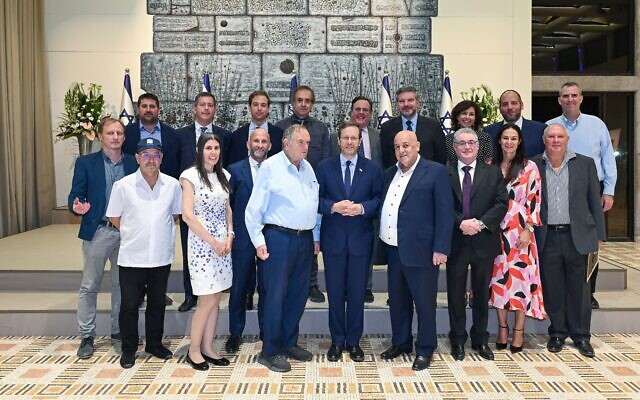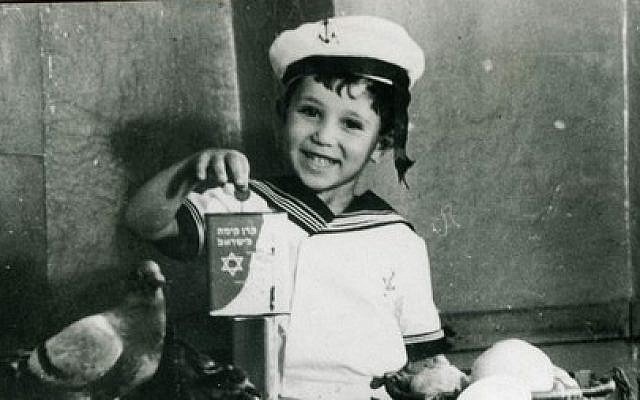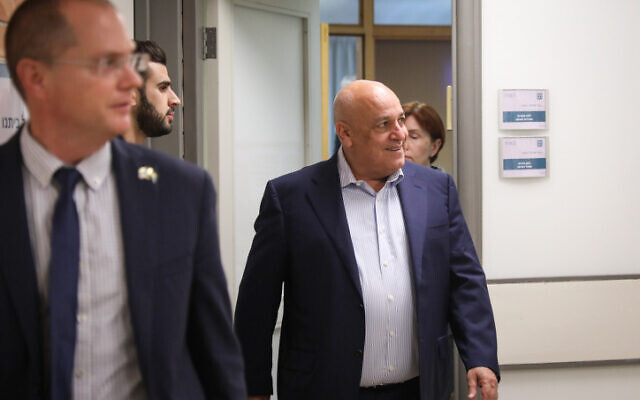Samuel Hayek, the Israeli-born British real estate tycoon, philanthropist and occasional political interlocutor, has a pessimistic view of where world Jewry is headed.
American Jews, he believes, are not likely to last more than another generation or two, due to interfaith marriages, while European Jewry and other communities around the world are being diluted by antisemitism and assimilation.
Whether or not one agrees with his assessments, Hayek is working to do something about it, chiefly by demanding that the Jewish National Fund-Keren Kayemet LeYisrael — an organization that he has been involved with for the past decade and a half — pledge NIS 1 billion ($295 million) a year for the next decade to shore up Jewish communities around the world, providing them with the resources they need to stay together and thrive.
This would be a dramatic shift in the role of the JNF, which was officially founded 121 years ago to do almost the exact opposite. For decades, Jews around the world put their pennies in a blue JNF pushka, or charity box, to help build the Jewish state. Now, Hayek is calling on the organization to send its money back out to those Jews around the world.
“The Jewish communities around the world are being neglected at best — and completely ignored at worst — by Israel. The fact that we have a Diaspora Affairs Ministry is a good idea. But when you look at the budget of this ministry, it indicates that the attitude of the Israeli government towards the Diaspora is not serious,” said Hayek, the head of the Jewish National Fund-United Kingdom, a related, but technically distinct organization from Israel’s Jewish National Fund-Keren Kayemet LeYisrael. (Most countries have their own affiliated but discrete JNF.)
Get The Times of Israel's Daily Edition by email and never miss our top stories
Hayek spoke to The Times of Israel in the back of his SUV, as we barreled north on the Route 6 highway toward the President’s Residence from the southern development town of Yeruham, where JNF-UK has donated millions of shekels in recent years. That day, JNF-UK trustees inaugurated a new promenade along one of the entrances to the town, before traveling to Jerusalem for a meeting with President Isaac Herzog.
“So where can we find the human and financial resources to secure the long-term existence of Jewish communities around the world?” Hayek said. “Keren Kayemet LeYisrael was collecting penny to penny to acquire land so when the Jews came to live in Israel they’d have a plot of land to cultivate and to build their homes. Today, KKL owns 13% of the entire landmass of the State of Israel — and that’s some of the best places in Israel — that is an asset that KKL is holding for the Jewish people.
Do you know what we could do with 1 billion shekels a year? A lot
“Its annual income amounts to billions of shekels each year. Is it so far-fetched to suggest that KKL allocate NIS 1 billion a year for the next 10 years? To save our people, to save Jewish communities around the world?” he said.
“The last thing that you could say about me is that I’m a dreamer, I am not. I think this is feasible.”
Although he is very polite in discussing his NIS 1 billion proposal, Hayek is not necessarily asking nicely. Evident from his demand is a not-so-subtle warning to the JNF, an organization that has for years been accused of corruption, nepotism, playing politics despite being tax-exempt, and paying its top employees inflated salaries, among other things.

Jewish National Fund-United Kingdom board of trustees meet with President Isaac Herzog on November 22, 2022. (Talya Sivan/JNF-UK)
“I think they have to do it. Look at the image that the KKL has made for itself over the last 15-20 years. It has a bad name. And the voices against it are coming from everywhere. ‘Let’s nationalize it. Who needs them?'” Hayek said.
“The perception is that the government would manage the assets of KKL better than KKL… [it] suffers from a very bad image. If KKL would take such a project, that would make a tremendous change to its image,” he said.
Indeed, right-wing and left-wing governments have taken issue with the organization’s practices over the years and some have called for it to be nationalized.

A child holds up a KKL-JNF blue box to collect donations in this undated photo. The blue box was one of the first ways to raise money for the fledgling KKL-JNF Jewish National Fund and was common in many Jewish homes. (Courtesy KKL-JNF)
Hayek also sees such massive investment in Jewish communities around the world as something that the Israeli government would simply not be capable of doing.
“If they did come to KKL and took its money, do you think they would put NIS 1 billion to saving Jewish communities around the world? It’s beyond the realm of reason,” he said.
Though Hayek has specific plans for advancing the issue within the organization, he is a bit fuzzier on how exactly that money would be spent. He has a general idea of sending emissaries to Jewish communities around the world — in a more robust, comprehensive manner than organizations like the Jewish Agency currently do — but believes those details can be worked out relatively quickly with a team of experts.
“I need to convince the board of KKL first that they have to and that they should change their aim,” he said. “Then let’s have a group, a think tank, that would devise the tools, the best tools and the best plans to achieve that goal. I don’t think we need a year to get these device tools in place. I think it could be done within a few months once a decision is made.
“We need to recruit hundreds of envoys that would not leave one Jewish community around the world on its own. And for these envoys to go to these communities, to live with them, to connect them to Israel, teach them Hebrew, teach them Judaism. You could not leave Judaism out of the equation. Judaism is the main tool that connects people to the land that was promised to our forefathers,” he said.
“I think that if this is done, there will be change within a few years. Do you know what we could do with NIS 1 billion a year? A lot.”
From Kfar Saba to London
Since 2008, Hayek has been the head of the Jewish National Fund-United Kingdom, helping revive the flagging organization.
Last year, Hayek caused a considerable stir in the British Jewish world after he told The Jerusalem Post that the community had no future due to rising Muslim immigration to the UK, prompting accusations of Islamophobia and denunciations from some top UK Jewish leaders, including British Chief Rabbi Ephraim Mirvis. Though he never apologized, Hayek later clarified that his remarks were somewhat misconstrued and that his concerns were “not against any minority or against the Muslims in the UK or Europe, but against anyone who spreads hatred that harms Jews.”
A year later, Hayek said he should have “chosen his words more carefully,” but that he was glad that his remarks sparked debate about the future of British Jewry. “It woke people up from their slumber,” he said.

Samuel Hayek walks out of a Yisrael Beytenu faction meeting with party member Oded Forer at the Knesset on May 29, 2019. (Noam Revkin Fenton/Flash90)
Born to Iraqi parents in the central Israeli town of Kfar Saba, Hayek served in the Israel Defense Forces during the Yom Kippur War before setting out for the United Kingdom to study law, after struggling to get accepted to an Israeli program.
Hayek became involved in right-wing politics from a young age, serving as chairman of the Likud youth department. He worked closely with Ariel Sharon and maintains ties with prime minister-to-be Benjamin Netanyahu and Yisrael Beytenu chief Avigdor Liberman, as well as a number of other prominent right-wing and centrist figures.
Though he has spent most of the past four decades in the United Kingdom, Hayek remained an important intermediary in right-wing political circles, helping broker deals between Netanyahu and Liberman after the latter split off from the Likud to form his Yisrael Beytenu party. Hayek remains extremely close with Yisrael Beytenu, and one of its members — Minister Oded Forer — even came down to Yeruham to meet Hayek during the visit.
Hayek, who owns a gallery in Jaffa, gets a wistful look in his eye when asked about Israeli and Jewish art.
“I think a person’s soul can’t survive for long without access to art, if that’s music, plastic arts, acting, or art of another kind. Once, a person — someone who is very important in this country — sat with me when I lived in Jaffa and got angry with me. ‘How can you waste so much money on a piece of canvas with paint on it? Aren’t there more important things than that in life?'” Hayek recalled. “How can you explain art to such a person?”
Until recently, he split his time between London and Tel Aviv, but a few months ago, he decided to live full-time in Ramat Gan, traveling back to the UK periodically to oversee his extensive real estate holdings in the country.
“Every time I would go to London, I looked for an excuse to come back to Israel early. And every time I came to Israel, I looked for excuses why I had to stay longer. So after years of that, I said, ‘Enough looking for excuses. If you want to be in Israel, be in Israel,'” he said.


